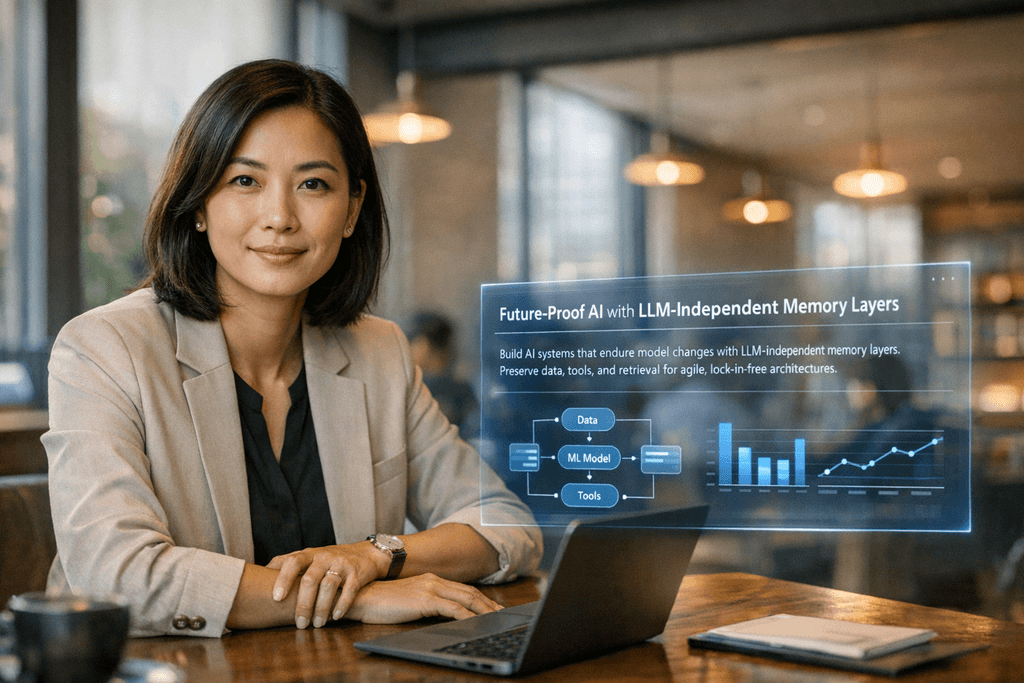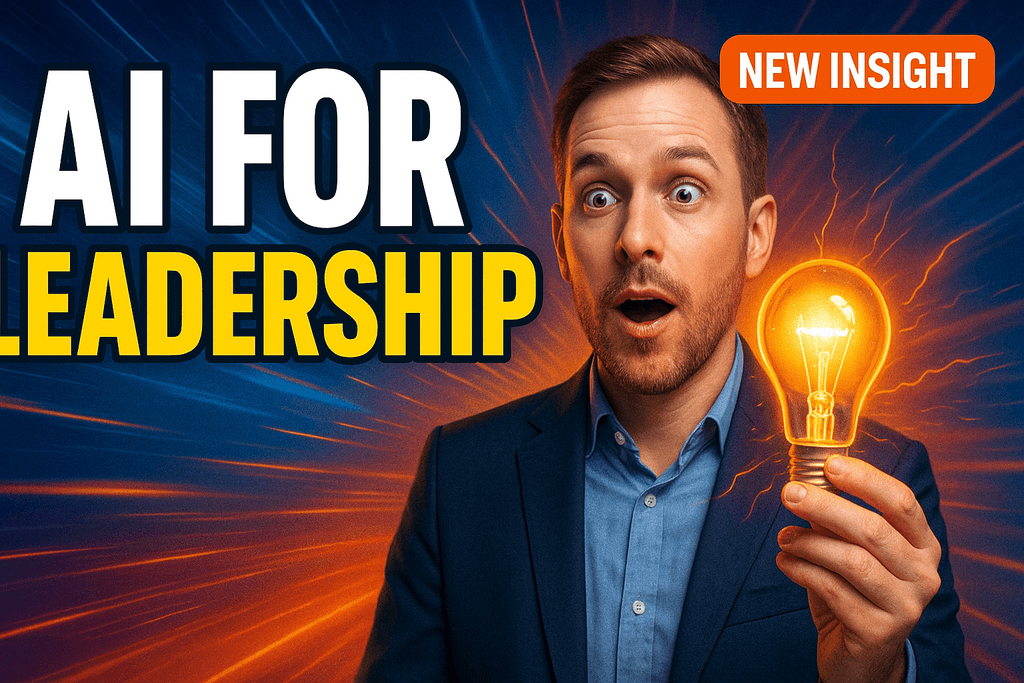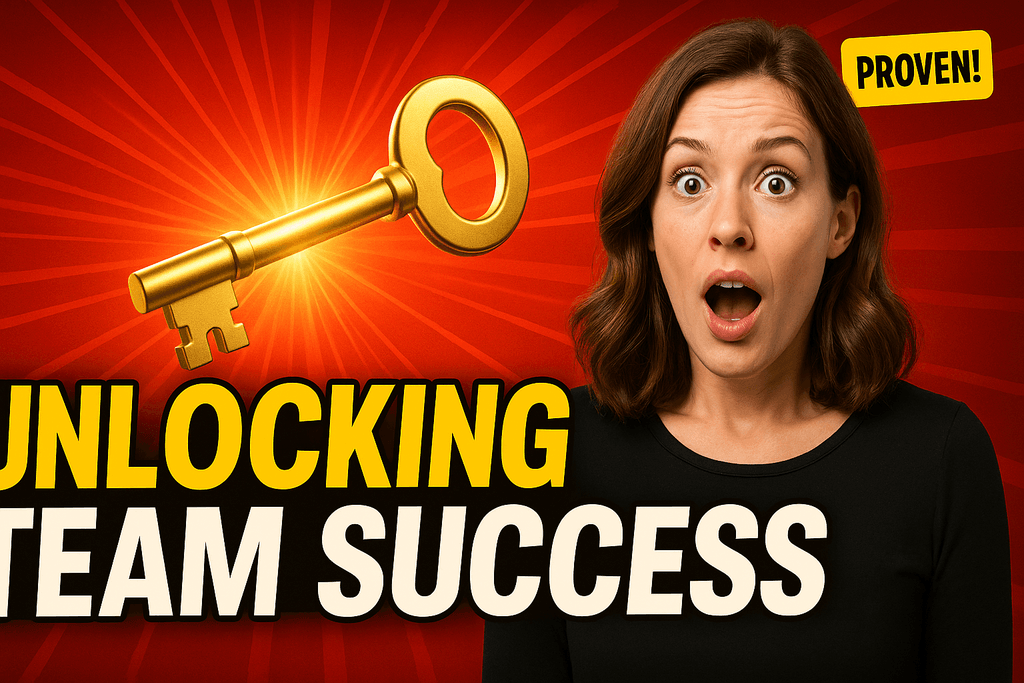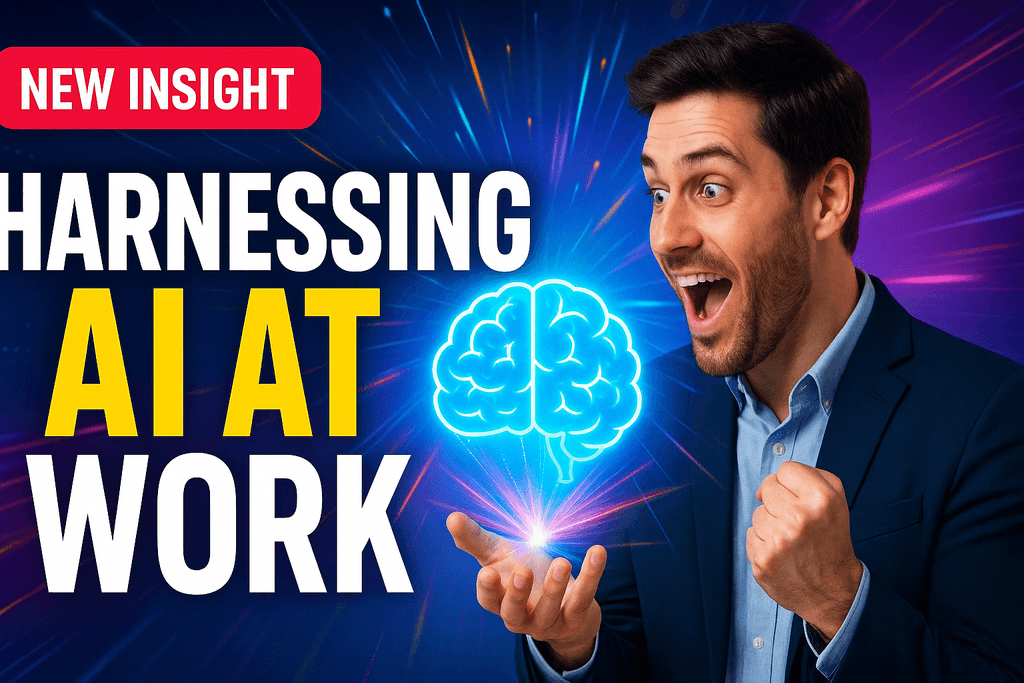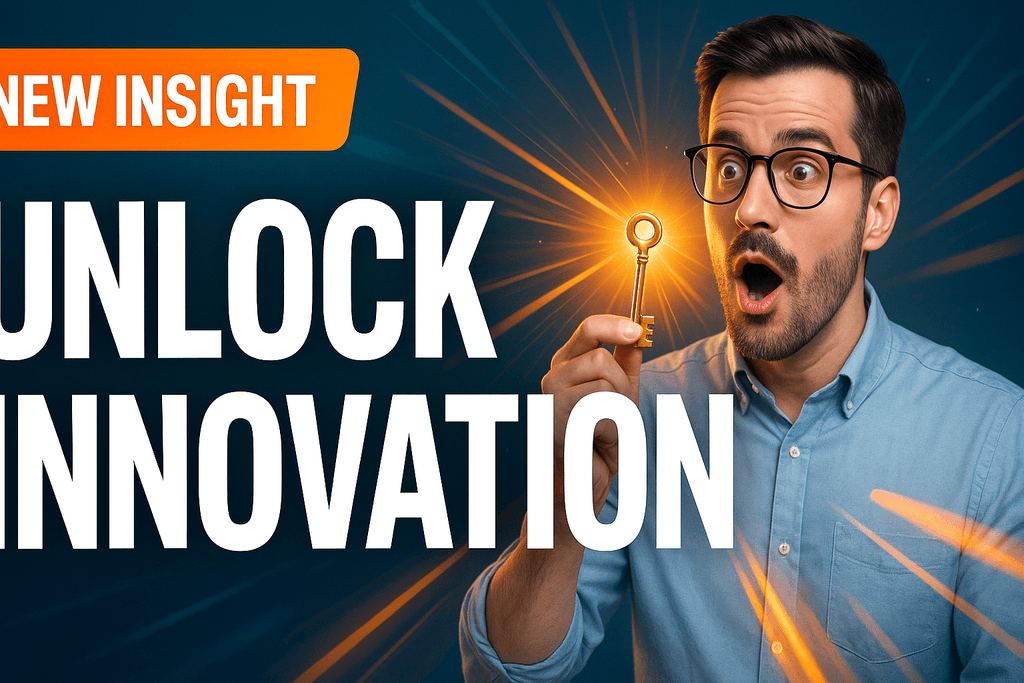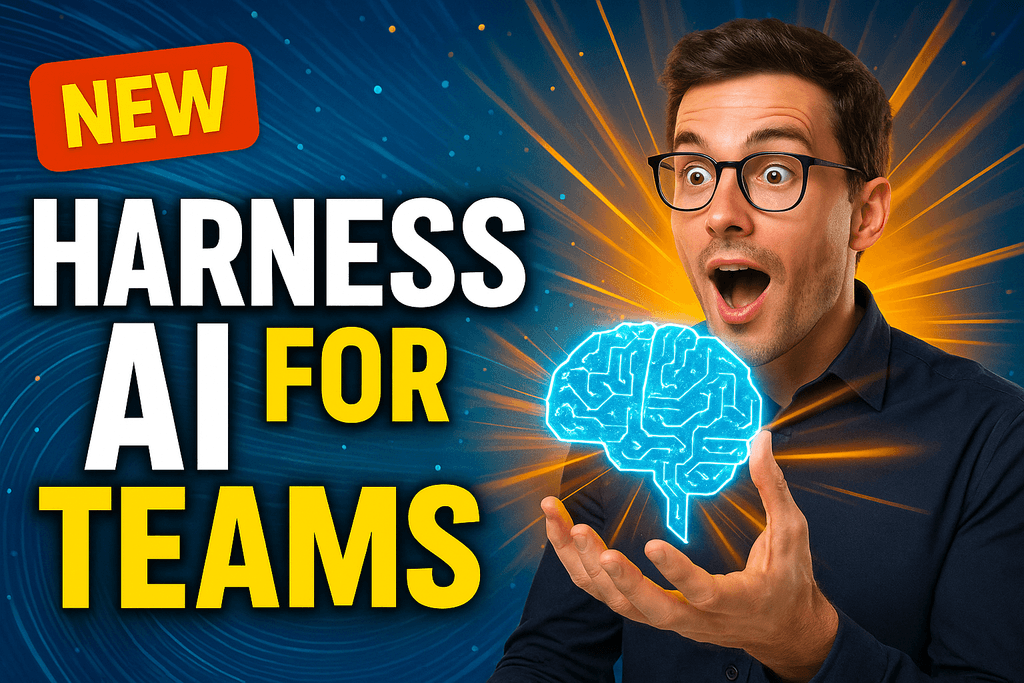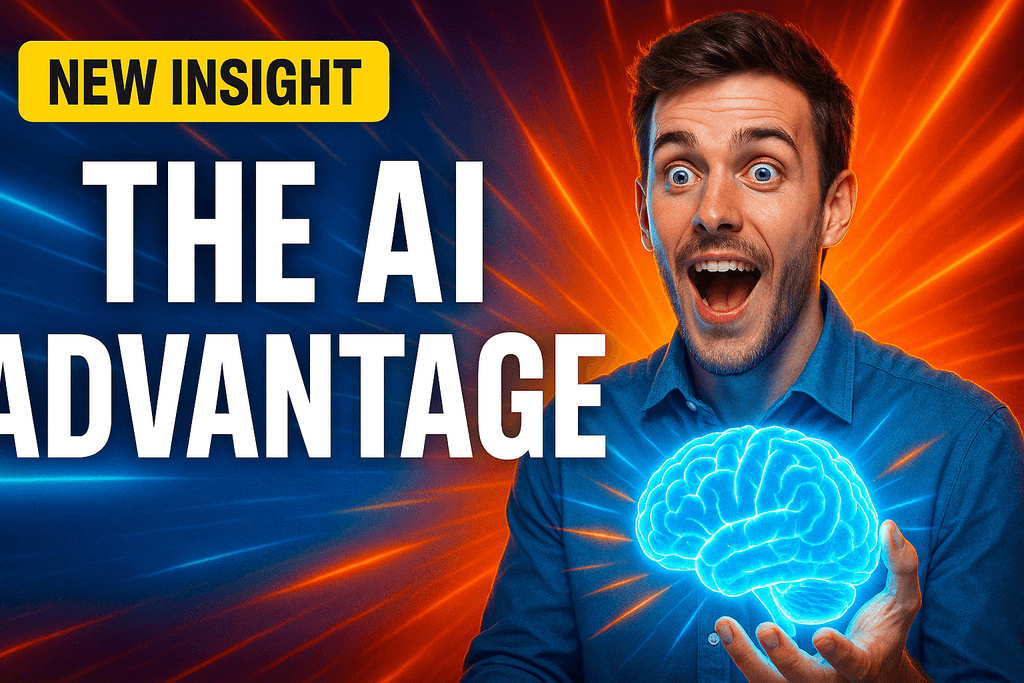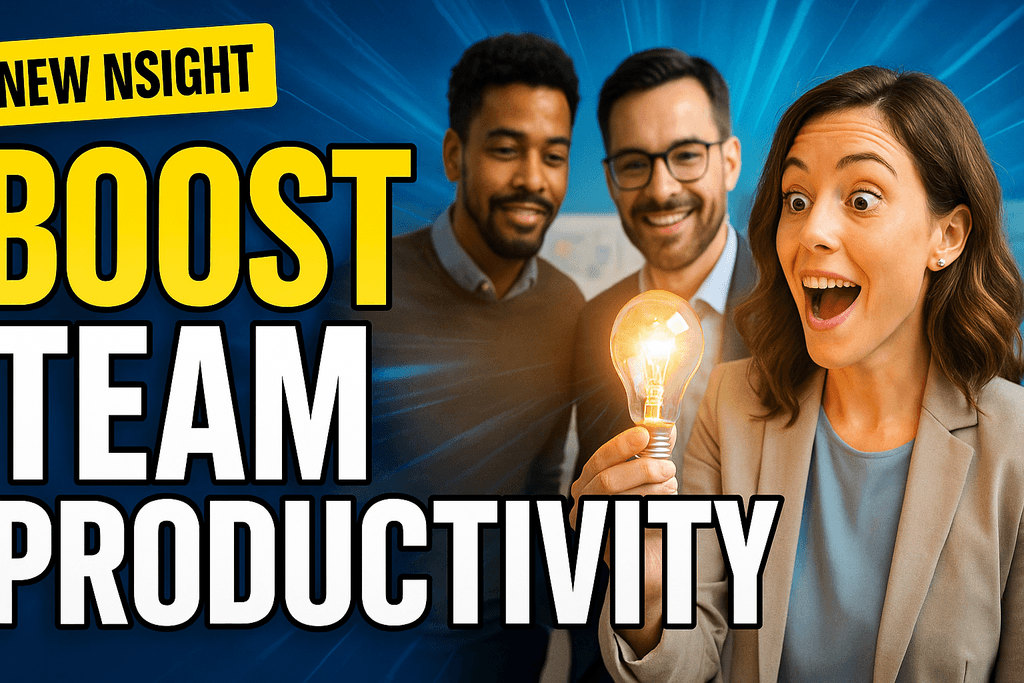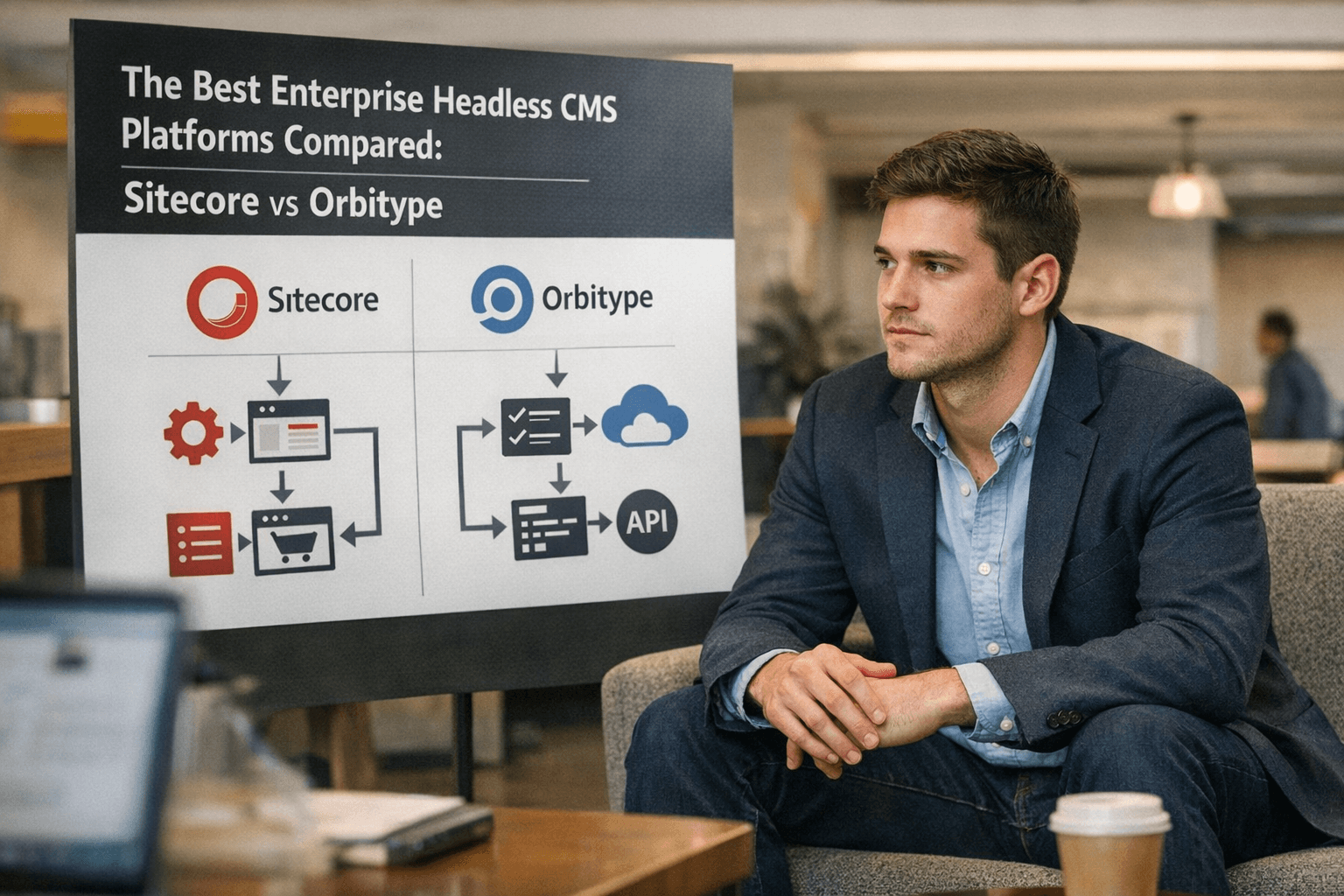
Table of Contents
Introduction
Choosing the right Headless CMS for your enterprise can be a complex decision, especially as your business scales and the demands of managing content across multiple platforms increase. Two popular enterprise-level Headless CMS platforms—Sitecore and Orbitype—are often at the top of the list when companies consider CMS solutions. But which one is best suited for your business needs?
In this blog, we'll compare Sitecore and Orbitype, breaking down their features, pros and cons, and the unique strengths of each platform. We'll also address a common problem businesses face when scaling their content operations and provide solutions to ensure your CMS can handle growing needs without compromising performance or flexibility. With the rise of AI agents and workflow automation, modern enterprises require platforms that can adapt and scale intelligently.
What is a Headless CMS?
Before diving into the comparison, let's briefly explore what a Headless CMS is and why it's essential for modern businesses. A Headless CMS decouples the front-end (the "head") from the back-end, allowing businesses to deliver content to any platform or device—whether it's a website, mobile app, IoT device, or digital screen. The back-end manages content through an API, making it highly flexible and scalable.
For enterprises, this approach is invaluable as it allows for the seamless delivery of content across multiple touchpoints, offering better control, easier updates, and improved user experience without the constraints of traditional CMS platforms. Modern headless CMS platforms increasingly integrate AI agents that can automate content workflows, analyze performance, and optimize delivery strategies autonomously.
If you're looking to optimize content for search and boost visibility, check out our guide on Unlocking the Potential of Headless CMS for Featured Snippets to learn how headless CMS platforms like Orbitype can improve SEO and snippet rankings.
Sitecore: Enterprise Powerhouse with Complex Features
Sitecore is one of the most recognized names in the enterprise CMS space. Known for its robustness, Sitecore offers a feature-rich environment that can handle complex, large-scale websites and content management needs.
Key Features of Sitecore:
Personalization: Sitecore is known for its advanced personalization features, enabling businesses to tailor content and experiences for individual users or customer segments. This makes it ideal for companies that require targeted messaging.
Multi-channel delivery: Sitecore ensures that content can be delivered seamlessly across multiple channels, including web, mobile, and email, allowing for consistent messaging.
Enterprise integrations: Sitecore can be integrated with a variety of other enterprise systems, such as CRMs, marketing automation tools, and data warehouses, creating a unified ecosystem.
Content management & marketing tools: Sitecore's comprehensive suite includes content management, marketing, and analytics tools, making it an all-in-one platform for enterprise-grade digital marketing.
Sitecore's Strengths:
Comprehensive enterprise features: Sitecore's vast array of tools makes it an excellent choice for large enterprises with complex marketing needs and multiple content creators.
Highly customizable: Sitecore can be highly tailored to meet specific business requirements, offering flexibility in design and functionality.
Sitecore's Challenges:
Complexity and learning curve: The platform can be overwhelming for businesses new to Headless CMS solutions. The extensive customization options require dedicated time and resources to learn and manage.
Pricing: Sitecore can be expensive, particularly for smaller businesses or those just starting to scale. The platform's cost structure can make it difficult to justify for companies looking for a more cost-effective solution.
Orbitype: Agentic Cloud OS with AI Workforce
Orbitype, on the other hand, is a newer player in the Headless CMS space, focusing on simplicity, flexibility, and scalability. Designed for businesses looking to manage content across multiple platforms with ease, Orbitype offers an API-first solution for enterprises. What sets Orbitype apart is its revolutionary approach as an Agentic Cloud OS—a platform where AI agents serve as an autonomous digital workforce.
Key Features of Orbitype:
API-first architecture: Orbitype's API-driven approach allows developers to seamlessly integrate the platform with a variety of tools and applications, offering greater flexibility in terms of content delivery.
AI Workforce Integration: Unlike traditional CMS platforms, Orbitype includes AI agents that have access to all data and processes, enabling intelligent automations, content analysis, and workflow optimization without human intervention.
Unified platform approach: Orbitype simplifies content management by unifying content, tools, and data in one platform, making it easier for teams to collaborate while AI agents handle routine tasks autonomously.
PostgreSQL & Cloud Storage: Built on a robust combination of PostgreSQL databases and S3 cloud storage, enhanced by compute resources and serverless functions for maximum scalability.
Workflow automation: Advanced workflow automation capabilities powered by AI agents that can orchestrate complex business processes, from content creation to approval and distribution.
Orbitype's Strengths:
Simplicity and ease of use: Orbitype is designed to be intuitive, making it easy for businesses to implement and scale without needing extensive technical expertise.
Cost-effective: Compared to Sitecore, Orbitype offers more flexible and affordable pricing options, making it a great choice for growing businesses that need enterprise-grade functionality without the high costs.
AI-powered automation: The integrated AI workforce enables unprecedented levels of automation, from content research and creation to customer relationship management and project orchestration.
For Vue.js and Nuxt.js developers, Orbitype offers a seamless integration experience. Learn more in our blog post on Unlocking the Full Potential of Vue.js and Nuxt.js with Orbitype.
AI Agents and Workflow Automation: The Game Changer
The integration of AI agents and workflow automation represents a fundamental shift in how enterprises approach content management and business operations. While traditional CMS platforms require manual oversight and intervention, AI-powered systems can operate autonomously, making intelligent decisions and optimizing processes in real-time.
How AI Agents Transform Enterprise Operations:
Autonomous Content Research: AI agents can automatically research topics, analyze competitor content, and generate comprehensive articles that align with SEO strategies and brand voice, significantly reducing manual content creation time.
Intelligent Customer Relationship Management: Beyond traditional CRM functionality, AI agents predict customer behavior, identify upselling opportunities, and automate personalized communication sequences based on interaction patterns and engagement metrics.
Dynamic Resource Management: AI agents intelligently allocate resources, predict project timelines, and automatically adjust workflows based on team capacity and project requirements, ensuring optimal resource utilization.
Automated Quality Assurance: AI agents continuously monitor content and processes for quality and compliance issues, automatically checking content for brand consistency, legal compliance, and technical accuracy before publication.
For enterprises looking to implement AI-powered automation, understanding the concrete benefits and ROI is crucial. Learn more about specific AI agent applications in our comprehensive guide on AI Agent Use Cases 2025: Maximizing Enterprise Efficiency.
Scalability and Flexibility: The Key Enterprise Challenge
A common problem businesses face when choosing a CMS is ensuring their platform can scale and remain flexible as the company grows. As enterprises expand and require more channels, content types, and integrations, a Headless CMS should be able to grow with them without requiring proportional increases in human resources or infrastructure costs.
The challenge: Many businesses struggle with rigid CMS platforms that can't easily adapt to new content strategies or technologies, making it difficult to meet the evolving needs of a growing enterprise. Traditional systems often require manual scaling, extensive customization, and significant resource investment for each expansion phase.
Solutions to the Scalability and Flexibility Problem:
Sitecore offers the flexibility needed for large-scale enterprises, but the complexity and cost can be a burden for businesses with rapidly changing needs. If you're ready to invest in long-term customization and integrations, Sitecore provides a powerful toolset for established enterprises with substantial budgets.
Orbitype, on the other hand, provides a simpler, more scalable approach for businesses looking for an API-first, flexible solution. With Orbitype's AI workforce, businesses can grow without the burden of managing overly complex systems or high costs. Its unified platform ensures content can easily be integrated into any existing workflow, while AI agents handle increasing workloads autonomously, maintaining consistent quality and efficiency as operations scale.
The key differentiator is that Orbitype's AI agents enable exponential scaling of operations without corresponding increases in overhead, breaking the traditional paradigm where business growth requires proportional resource increases.
Pricing and Implementation Comparison
Pricing is a critical factor in deciding between Sitecore and Orbitype, especially when considering the total cost of ownership and implementation complexity. Sitecore tends to be more expensive, making it a good choice for large enterprises with bigger budgets and dedicated IT teams. The pricing structure often includes licensing fees, customization costs, ongoing maintenance, and specialized training, which can add up quickly and require significant upfront investment.
Orbitype, on the other hand, offers more flexibility and is a cost-effective solution for growing businesses. Its pricing structure is designed to be scalable, so businesses can pay for only the features they need and grow as their requirements change. The AI workforce integration means that many tasks that would traditionally require additional human resources or third-party tools are handled autonomously, providing additional cost savings over time.
Implementation Considerations:
Sitecore Implementation: Typically requires months of planning, extensive customization, and specialized expertise. The complexity means longer time-to-market but offers deep customization capabilities for enterprises with specific requirements.
Orbitype Implementation: Designed for rapid deployment with AI agents that can be configured and trained quickly. The platform's intuitive design and automated workflows mean faster time-to-value and reduced dependency on specialized technical resources.
For businesses looking to understand the concrete ROI of AI-powered automation, explore our detailed analysis on Automating Content Workflows with Orbitype's Custom Solutions.
Conclusion: Which is Best for Your Enterprise?
Choosing the right Headless CMS depends on your specific needs, budget, and long-term strategic goals. If your enterprise requires advanced marketing tools, deep personalization capabilities, and extensive enterprise integrations with an established budget for complex implementations, Sitecore may be the right choice for large, established organizations with dedicated IT resources.
However, if you're looking for a flexible, cost-effective solution that can easily scale with your business while leveraging the power of AI agents and workflow automation, Orbitype offers a modern, API-first approach to content management that allows for growth without complexity. The integrated AI workforce enables unprecedented levels of automation and efficiency, making it ideal for forward-thinking enterprises that want to future-proof their operations.
Consider your company's size, scalability needs, budget constraints, and appetite for AI-driven automation when making your decision. Both platforms offer significant benefits for enterprise use cases, but Orbitype's Agentic Cloud OS represents the next evolution in enterprise content management, where AI agents handle routine tasks and optimize workflows autonomously, allowing human teams to focus on strategic initiatives and creative problem-solving.
The future belongs to organizations that can rapidly adapt to changing market conditions and customer needs, and Orbitype's AI agents provide exactly that capability through continuous learning and optimization.








